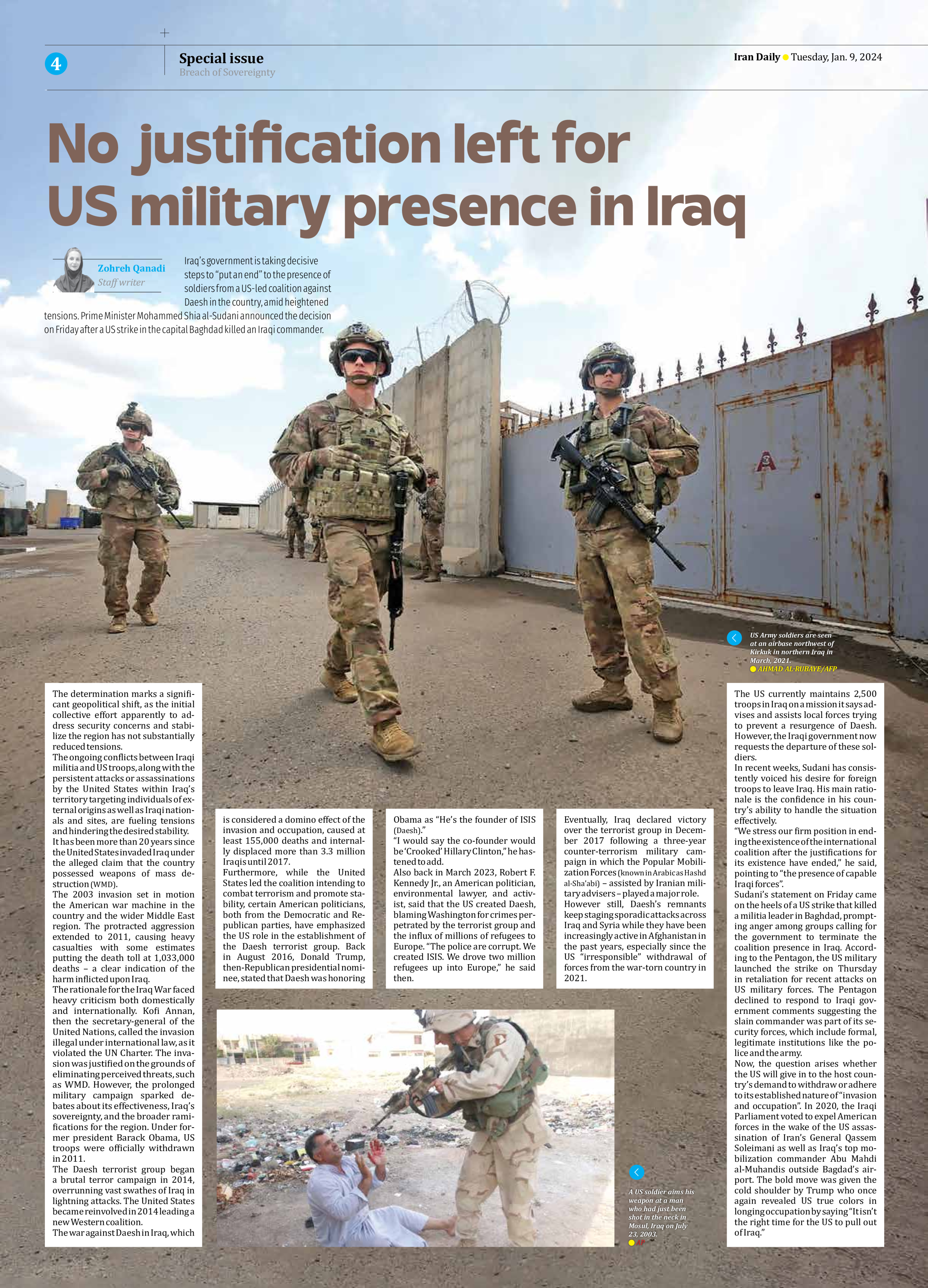
No justification left for US military presence in Iraq
Zohreh Qanadi
Staff writer
Iraq’s government is taking decisive steps to “put an end” to the presence of soldiers from a US-led coalition against Daesh in the country, amid heightened tensions. Prime Minister Mohammed Shia al-Sudani announced the decision on Friday after a US strike in the capital Baghdad killed an Iraqi commander.
The determination marks a significant geopolitical shift, as the initial collective effort apparently to address security concerns and stabilize the region has not substantially reduced tensions.
The ongoing conflicts between Iraqi militia and US troops, along with the persistent attacks or assassinations by the United States within Iraq’s territory targeting individuals of external origins as well as Iraqi nationals and sites, are fueling tensions and hindering the desired stability.
It has been more than 20 years since the United States invaded Iraq under the alleged claim that the country possessed weapons of mass destruction (WMD).
The 2003 invasion set in motion the American war machine in the country and the wider Middle East region. The protracted aggression extended to 2011, causing heavy casualties with some estimates putting the death toll at 1,033,000 deaths – a clear indication of the harm inflicted upon Iraq.
The rationale for the Iraq War faced heavy criticism both domestically and internationally. Kofi Annan, then the secretary-general of the United Nations, called the invasion illegal under international law, as it violated the UN Charter. The invasion was justified on the grounds of eliminating perceived threats, such as WMD. However, the prolonged military campaign sparked debates about its effectiveness, Iraq’s sovereignty, and the broader ramifications for the region. Under former president Barack Obama, US troops were officially withdrawn in 2011.
The Daesh terrorist group began a brutal terror campaign in 2014, overrunning vast swathes of Iraq in lightning attacks. The United States became reinvolved in 2014 leading a new Western coalition.
The war against Daesh in Iraq, which is considered a domino effect of the invasion and occupation, caused at least 155,000 deaths and internally displaced more than 3.3 million Iraqis until 2017.
Furthermore, while the United States led the coalition intending to combat terrorism and promote stability, certain American politicians, both from the Democratic and Republican parties, have emphasized the US role in the establishment of the Daesh terrorist group. Back in August 2016, Donald Trump, then-Republican presidential nominee, stated that Daesh was honoring Obama as “He’s the founder of ISIS (Daesh).”
“I would say the co-founder would be ‘Crooked’ Hillary Clinton,” he hastened to add.
Also back in March 2023, Robert F. Kennedy Jr., an American politician, environmental lawyer, and activist, said that the US created Daesh, blaming Washington for crimes perpetrated by the terrorist group and the influx of millions of refugees to Europe. “The police are corrupt. We created ISIS. We drove two million refugees up into Europe,” he said then.
Eventually, Iraq declared victory over the terrorist group in December 2017 following a three-year counter-terrorism military campaign in which the Popular Mobilization Forces (known in Arabic as Hashd al-Sha’abi) – assisted by Iranian military advisers – played a major role.
However still, Daesh’s remnants keep staging sporadic attacks across Iraq and Syria while they have been increasingly active in Afghanistan in the past years, especially since the US “irresponsible” withdrawal of forces from the war-torn country in 2021.
The US currently maintains 2,500 troops in Iraq on a mission it says advises and assists local forces trying to prevent a resurgence of Daesh. However, the Iraqi government now requests the departure of these soldiers.
In recent weeks, Sudani has consistently voiced his desire for foreign troops to leave Iraq. His main rationale is the confidence in his country’s ability to handle the situation effectively.
“We stress our firm position in ending the existence of the international coalition after the justifications for its existence have ended,” he said, pointing to “the presence of capable Iraqi forces”.
Sudani’s statement on Friday came on the heels of a US strike that killed a militia leader in Baghdad, prompting anger among groups calling for the government to terminate the coalition presence in Iraq. According to the Pentagon, the US military launched the strike on Thursday in retaliation for recent attacks on US military forces. The Pentagon declined to respond to Iraqi government comments suggesting the slain commander was part of its security forces, which include formal, legitimate institutions like the police and the army.
Now, the question arises whether the US will give in to the host country’s demand to withdraw or adhere to its established nature of “invasion and occupation”. In 2020, the Iraqi Parliament voted to expel American forces in the wake of the US assassination of Iran’s General Qassem Soleimani as well as Iraq’s top mobilization commander Abu Mahdi al-Muhandis outside Bagdad’s airport. The bold move was given the cold shoulder by Trump who once again revealed US true colors in longing occupation by saying “It isn’t the right time for the US to pull out of Iraq.”







